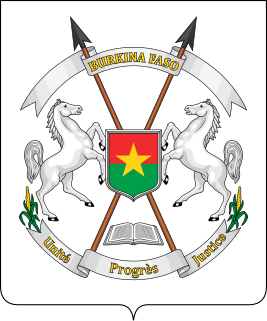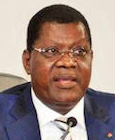| |||||
| Decades: | |||||
|---|---|---|---|---|---|
| See also: | |||||
Events in the year 2008 in Burkina Faso .
| |||||
| Decades: | |||||
|---|---|---|---|---|---|
| See also: | |||||
Events in the year 2008 in Burkina Faso .

Burkina Faso is a landlocked country in West Africa with an area of 274,200 km2 (105,900 sq mi), bordered by Mali to the northwest, Niger to the northeast, Benin to the southeast, Togo and Ghana to the south, and the Ivory Coast to the southwest. It has a population of 20,321,378. Previously called Republic of Upper Volta (1958–1984), it was renamed Burkina Faso by President Thomas Sankara. Its citizens are known as Burkinabè, and its capital and largest city is Ouagadougou.

The Politics of Burkina Faso takes place in a framework of a semi-presidential republic, whereby the Prime Minister of Burkina Faso is the head of government, and of a multi-party system. The President of Burkina Faso is the head of state. Executive power is exercised by both the President and the Government. Legislative power is vested in both the government and parliament. The party system was dominated by the Congress for Democracy and Progress (CDP) until the 2014 Burkinabé uprising. Since then, the CDP has lost influence. The Judiciary is independent of the executive and the legislature. The Economist Intelligence Unit rated Burkina Faso a "hybrid regime" in 2019.

The history of Burkina Faso includes the history of various kingdoms within the country, such as the Mossi kingdoms, as well as the later French colonisation of the territory and its independence as the Republic of Upper Volta in 1960.

Thomas Isidore Noël Sankara was a Burkinabé military officer, Marxist revolutionary, and pan-Africanist, who served as President of Burkina Faso from his coup in 1983 to his deposition and murder in 1987. Viewed by supporters as a charismatic and iconic figure of revolution, he is commonly referred to as 'Africa's Che Guevara'.

Blaise Compaoré is a Burkinabé-Ivorian former politician who served as the second president of Burkina Faso from 1987 to 2014. He was a close associate of the first president, Thomas Sankara, during the 1980s, and in October 1987, he led a coup d'état during which Sankara was killed. Subsequently, he introduced a policy of 'rectification', overturning the leftist and Third Worldist policies pursued by Sankara. He won elections in 1991, 1998, 2005 and 2010, in what were considered unfair circumstances. His attempt to amend the constitution to extend his 27-year term caused the 2014 Burkinabé uprising. On 31 October 2014, Compaoré resigned, whereupon he fled to the Ivory Coast.

Youssouf Ouédraogo was a Burkinabé politician. In 1992 he became the first Prime Minister of Burkina Faso since 1983, serving from 16 June 1992 to 22 March 1994. Ouédraogo, a member of the ruling Congress for Democracy and Progress (CDP), later served as Minister of State for Foreign Affairs from January 1999 to June 2007.

Balé is one of the 45 provinces of Burkina Faso, located in its Boucle du Mouhoun Region with Boromo as capital. Its area is 4,596 km2 (1,775 sq mi), and had a population of 297,367 in 2019. The province is known for its Deux Balé Forest, populated by savannah elephant herds. Boromo, the provincial capital, is located on the main road from Ouagadougou to Bobo-Dioulasso. In June 2007, the Canadian mining company, Semafo, open the third gold mine in the country in Mana in the province, with an investment of about $116 million.

Roch Marc Christian Kaboré is a Burkinabé banker and politician who served as the President of Burkina Faso from 2015 until he was deposed in 2022. He was the Prime Minister of Burkina Faso between 1994 and 1996 and President of the National Assembly of Burkina Faso from 2002 to 2012. Kaboré was also president of the Congress for Democracy and Progress (CDP) until his departure from the party in 2014. He founded the People's Movement for Progress party that same year.

Michel Kafando is a Burkinabé diplomat who served as the transitional President of Burkina Faso from 2014 to 2015. He served in the government as Minister of Foreign Affairs from 1982 to 1983 and was the Permanent Representative (Ambassador) of Burkina Faso to the United Nations from 1998 to 2011.
Events from the year 2007 in Burkina Faso.
The 2008 Burkina Faso bus crash was a bus accident on 5:30 am, November 15, 2008, that claimed the lives of more than 60 persons near the town of Boromo in Burkina Faso. A heavily-loaded truck carrying 80 people collided with an overloaded bus carrying 95 people on National Highway 1, about six kilometres from Boromo. The bus, was on its way to Côte d'Ivoire. The run had started from Imasgho, and additional riders were picked up at Koudougou. The truck was traveling from Banfora. Following the collision, the bus caught fire and 54 persons were burned to death inside the bus. Eleven others who escaped died of their injuries. The victims were transported to the hospital at Souro Bobo. The truck driver reportedly survived the collision. Police investigators speculated that the truck driver had fallen asleep at the wheel, based on a lack of skid marks. The Burkina Faso Minister of Transport, Gilbert Noël Ouédraogo, commented that "We lament 96 victims, of whom 66 have died". It was considered the worst traffic accident in Burkina Faso since May 4, 2004, when 35 people died in the fiery collision of a bus and a gasoline truck at Niangoloko. On March 7, 1976, 23 UNESCO workers were killed after their bus fell into a ravine.
The 2011 Burkina Faso protests were a series of popular protests in Burkina Faso.

General elections were held in Burkina Faso on 29 November 2015. The elections were the first national elections in the country since the 2014 Burkinabé uprising and the departure of President Blaise Compaoré, who had ruled Burkina Faso for 27 years. The party of former President Compaoré, the Congress for Democracy and Progress, was banned from presenting a presidential candidate in the presidential elections but was still able to participate in the parliamentary election.

The 2014 Burkina Faso uprising was a series of demonstrations and riots in Burkina Faso in October 2014 that quickly spread to multiple cities. They began in response to attempts at changing the constitution to allow President Blaise Compaoré to run again and extend his 27 years in office. Pressure for political change came from civil society and in particular from the country's youth. Following a tumultuous day on 30 October, which included the involvement of former Defence Minister Kouamé Lougué and the burning of the National Assembly and other government buildings as well as the ruling Congress for Democracy and Progress party's headquarters, Compaoré dissolved the government and declared a state of emergency before eventually fleeing to Côte d'Ivoire with the support of President Alassane Ouattara.

Burkina Faso–India relations refers to the international relations that exist between Burkina Faso and India. Burkina Faso maintains an embassy in New Delhi. India maintained an embassy in Ouagadougou from November 1996 until its closure in July 2002. Currently, India maintains an honorary consulate in Ouagadougou, which functions under the jurisdiction of the High Commission of India in Accra, Ghana.

The 1987 Burkina Faso coup d'état was a bloody military coup in Burkina Faso, which took place on 15 October 1987. The coup was organized by Captain Blaise Compaoré against incumbent far-left President Captain Thomas Sankara, his former friend and associate during the 1983 upheaval.
Events in the year 2013 in Burkina Faso.
Events in the year 2011 in Burkina Faso.
Events in the year 2010 in Burkina Faso.